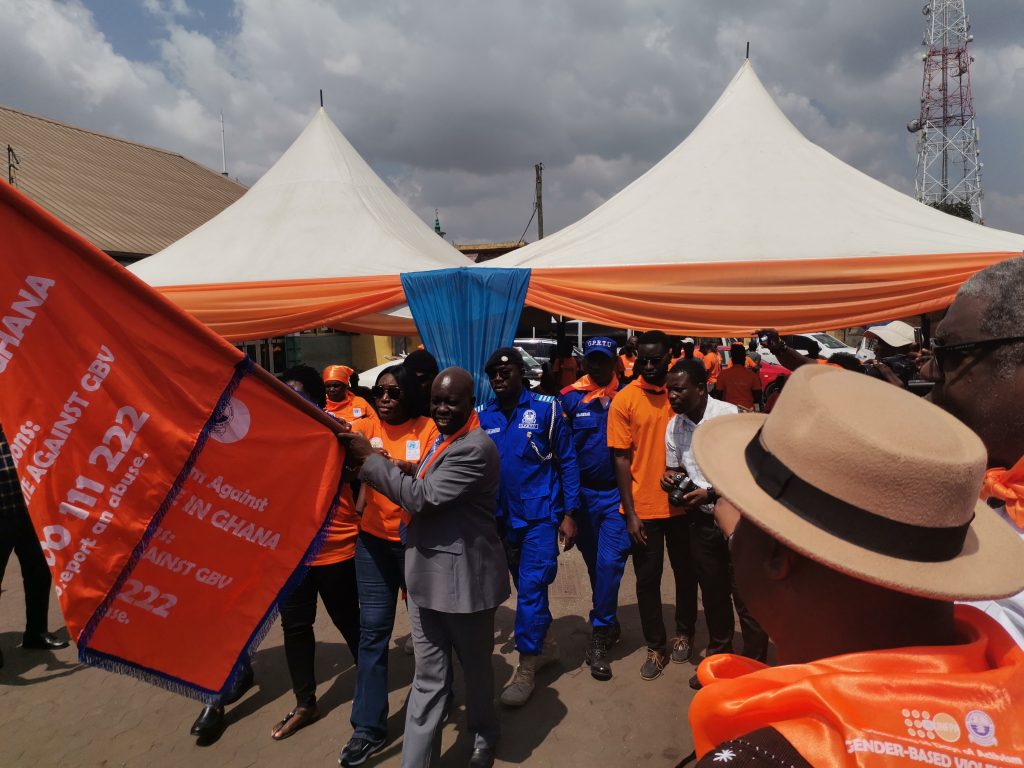By Priscilla Oye Ofori
Accra, Nov. 27, GNA – The United Nations Population Fund (UNFPA) and some partners have launched the “16 Routes, 16 Stations: Transport Unions Unite Against GBV” under the 16 Days of Activism campaign against Gender-Based Violence (GBV).
The initiative is a social drive designed to galvanise support against GBV from transport operators including taxis, trotro and intercity buses, and passengers in the country.
The Activism campaign is an annual international one that begins on November 25 to mark the International Day for the Elimination of Violence Against Women through to December 10, Human Rights Day.
It is a mobilising strategy to call on governments, decision-makers, and stakeholders to come together, reflect, and act on issues affecting the holistic development of women and girls.
The global theme for this year’s campaign is: “Towards Beijing +30: Unite to End Violence Against Women and Girls.”
However, Ghana’s is: “30 Years after the Beijing Declaration and Platform for Action: Unite to End Violence against Women and Girls in Ghana,” and the event was held in partnership with the Ministry of Gender Children and Social Protection (MoGCSP), the Ghana Private Road and Transport Union (GPRTU) and MTN Ghana.
Dr David Wilfred Ochan, the UNFPA Country Representative, said the campaign is a call to action, a reminder that we must work together to create a safer, more equitable environment for all.
He said public transport serves as an essential lifeline for millions of people, connecting communities and bridging distances.
Dr Ochan said hence, it would be an avenue to disseminate the messages of hope and prevention, response, and action against GBV.
He said, “Over the next 16 Days of Activism, we will mobilise Ghana’s transport sector to foster critical conversations about GBV, what drives it generally, but more so within the transport sector, and its impact on our society.”
He said through the daily dialogue, sharing of information, education and communication materials, and grassroots engagements, it would spark a movement that reached the public and it is likely to even spill over to the print and other public media.’
“Together we can create transport systems free of GBV by fostering accountability and adopting policies that ensure safety and dignity within the transport sector benefiting all transport operators and passengers.”

Ms Dakoa Newman, Minister of the Gender Ministry said despite the existence of legal frameworks, international conventions, and treaties, violence against women and girls remained a significant barrier to achieving gender equality in Ghana.
She expressed worry over the reports of women being killed in their matrimonial homes or in public spaces, and abuse of girls, describing these as troubling and entirely unacceptable because its effect on their health, psychological, and emotional well-being compromised and undermined society’s development.
Ms Newman said GBV, including domestic violence, violated the fundamental human rights of survivors and weakened the nation’s developmental goals.
“These incidents demand our collective and urgent action to fight this menace. Let us commit to promoting the safety, dignity, and advancement of women and girls in Ghana,” the Minister added.
She announced that as part of the campaign, the Ministry intended to organise three community sensitisation activities in the Central, Eastern, and Greater Accra Regions as well as participate in UNFPA-led activities.
Mr Charles Abani, the United Nations Resident Coordinator, said the partnership between UNFPA and the GPRTU was a powerful example of innovative actions to end GBV.
He said the UN had been at the forefront of efforts to end GBV for over two decades.
“Let us unite and ensure that the next generation inherits a world of safety, dignity and opportunity,” Mr Abani said.
Mr Godfred Abulbire, the General Secretary, Ghana Private Road Transport Union, noted that apart from the media, the transport sector disseminated messages that could be remembered everywhere.
“The message is that we are an appropriate body that can help to disseminate, advocate and do what we call behavior change,” he said.
He encouraged the Union members and other drivers to learn and spread the message of GBV.
GNA